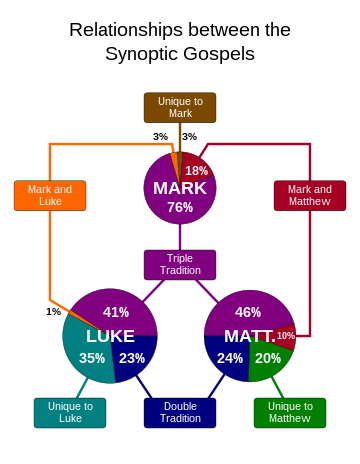The usual problem... Baha'is say how great Jesus was, but now here's another thing he supposedly did that isn't true? Is this an official Baha'i stance? Because you make it sound like the synoptic gospel writers were making things up. I don't have a problem with that. But where did they get this information? And, why was it believed and is still believed today by some Christians? But then, not only demons, but many Christians believe Satan is real. They absolutely need Satan and the demons to make sense of their story of why Jesus had to come and sacrifice himself to save humankind. If there is no Satan and demons, then where does that leave Christianity?
The Baha'i writings make no distinction between the synoptics and the gospel of John. But understanding how the gospels were written helps us make sense of the manner in which the story of Christ is told. So a simple study that looks at the material the gospels have in common is a great starting point.

The gopsels Mark, Luke and Matthew are referred to as the Synoptic Gospels because they include many of the same stories, often in a similar sequence and in similar or sometimes identical wording. So the idea that we see these three gospels, of "giving an account of the events from the same point of view or under the same general aspect" is an important concept.
This strong parallels among the three gospels in content, arrangement, and specific language is widely attributed to literary interdependence. The question of the precise nature of their literary relationship, the synoptic problem has been a topic of lively debate for centuries and has been described as "the most fascinating literary enigma of all time". The longstanding majority view favors a scenario in which both Matthew and Luke have made direct use of the Gospel of Mark as a source, and further holds that Matthew and Luke also drew from an additional hypothetical document, called Q.
Synoptic Gospels - Wikipedia
What these gospel are unlikely to be are three independant eye witness accounts. The have collaborated and its most likely that Mark was written first given the relatively large amount of common material in both Luke and Matthew. Also most of the material used in Mark is used in either Luke or Matthew. Very little of the material in Mark is unique to Mark (3%).
Mark is considered to be written at about 66 AD at the earliest. The author to Mark is anonymous. Papias attributed the book to John Mark a companiion of the apostle Peter although most scholars are content to identify the auther as unknown. Regardless, the author wasn't an eye witness to the events that were written. The gospelof Luke is attributed to Luke the physician who was a companion of Paul, but there are problems with this theory in that there is conflict between the stories in Acts and Paul's epistles to suggest he probably wasn't a companion of Paul at all.
The last of the synoptic gospels to be written was Matthew. Matthew was thought to be written between 80 - 90 AD. The author is anonymous. If the author was really Matthew the tax collector and disciple of Jesus, why did he rely so heavily on Mark?
I think it is unlikely that the author wrote versions in both Greek and Hebrew, and the earliest reference to gospel of Matthew is from Papias who refers to a Hebrew, not Greek text. Eusebius then quotes Papias. However the gospel of Matthew is written in Greek, not Hebrew, so the whole argument about Matthew being the author based on Papias essentially collapses.
'The Gospel of Matthew is anonymous: the author is not named within the text, and the superscription "according to Matthew" was added some time in the 2nd century. The tradition that the author was Matthew the Apostle begins with Papias of Hierapolis (c. AD 100–140), an early bishop and Apostolic Father, who is cited by the Church historian Eusebius (AD 260–340), as follows: "Matthew collected the oracles [logia: sayings of or about Jesus] in the Hebrew language [Hebraïdi dialektōi], and each one interpreted [hērmēneusen—perhaps 'translated'] them as best he could." On the surface this could imply that Matthew's gospel itself was written in Hebrew or Aramaic by the apostle Matthew and later translated into Greek, but nowhere does the author claim to have been an eyewitness to events, and Matthew's Greek "reveals none of the telltale marks of a translation." Scholars have put forward several theories to explain Papias: perhaps Matthew wrote two gospels, one, now lost, in Hebrew, the other the surviving Greek version; or perhaps the logia were a collection of sayings rather than the gospel; or by dialektōi Papias may have meant that Matthew wrote in the Jewish style rather than in the Hebrew language.The consensus is that Papias does not describe the Gospel of Matthew as we know it, and it is generally accepted that Matthew was written in Greek, not in Aramaic or Hebrew.'
Gospel of Matthew - Wikipedia
